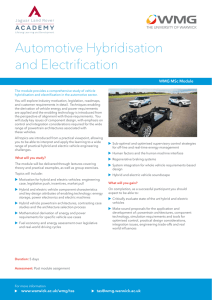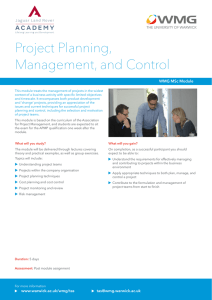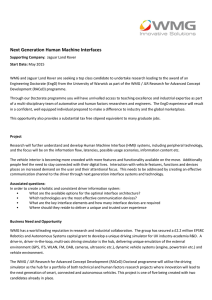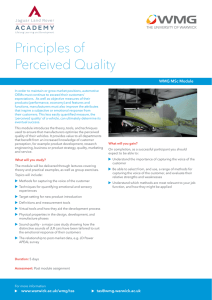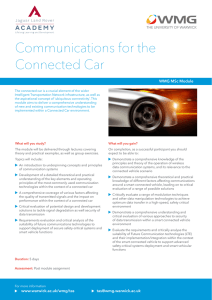Intelligent Eco-friendly Vehicles
advertisement
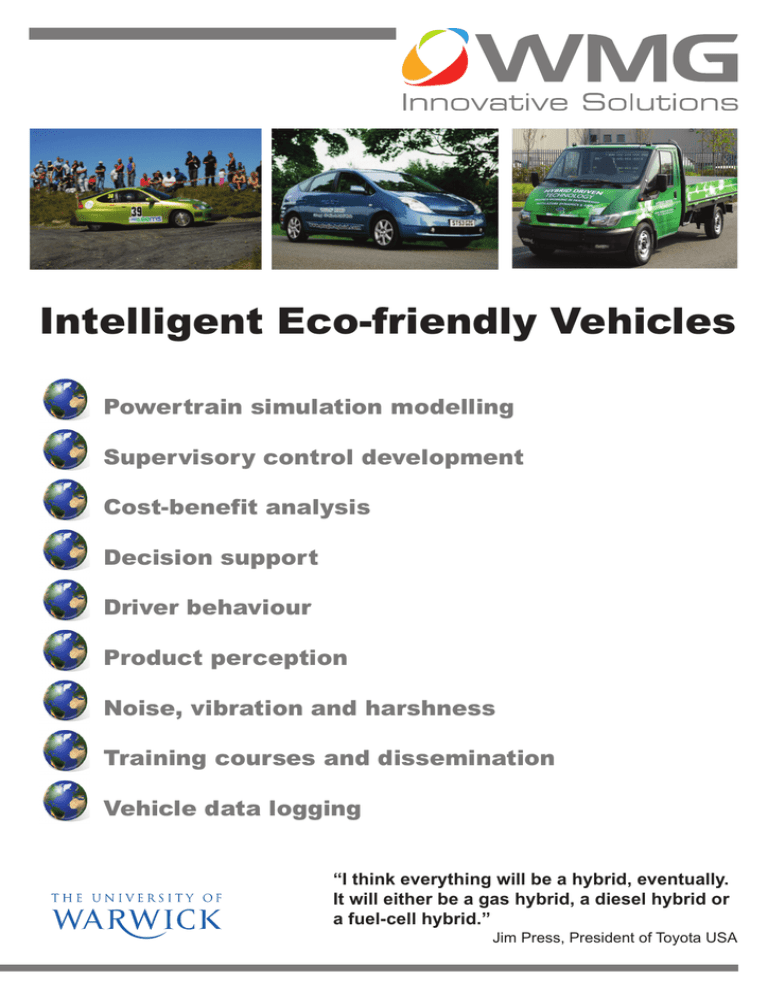
Intelligent Eco-friendly Vehicles Powertrain simulation modelling Supervisory control development Cost-benefit analysis Decision support Driver behaviour Product perception Noise, vibration and harshness Training courses and dissemination Vehicle data logging “I think everything will be a hybrid, eventually. It will either be a gas hybrid, a diesel hybrid or a fuel-cell hybrid.” Jim Press, President of Toyota USA Photo: Stefan Wernli Photo: Ansgar Walk Photo: Donald Breddy "It's a challenge to the moral imagination of humankind to actually accept the reality of the situation we are now facing. "We're not used to thinking of a planetary emergency, and there's nothing in our prior history as a species that equips us to imagine that we, as human beings, could actually be in the process of destroying the habitability of the planet for ourselves." Al Gore, former US Presidential candidate More than 20 per cent of CO2 is produced from automotive emissions and this is continuing to rise, even though CO2 emissions per car are falling. Damage caused by flooding in Boscastle, Cornwall, August 2004. A Toyota Prius zips along during rush hour in the carpool lane of the southbound 405 Freeway. The challenge for the automotive industry is to achieve the improvements required to reduce emissions from their products, while making products customers want, but doing so without increasing GHG production during manufacture. Within the industry there are a multitude of research and development routes linked to a number of technologies. This tends to lead to a “wait and see” approach being taken during future strategy discussions. Therefore, a methodology and suitable tools to facilitate these decisions would be highly beneficial. Photo: Lori Shepler/ LAT Research by WMG into intelligent eco-friendly vehicles analyses the benefits of introducing appropriate technologies as well as evaluating the business case. WARPSTAR WARwick Powertrain Simulation Tool for ARchitectures In support of the automotive industry’s development of eco-friendly vehicles, WMG has a research team working on hybrid vehicle powertrain simulation and control. The team has developed a suite of simulation packages, one of which is a modelling structure called WARwick Powertrain Simulation Tool for ARchitectures (WARPSTAR), to address a wide range of issues. WARPSTAR is a drive cycle-led simulation structure to facilitate the powertrain modelling of hybrid vehicles. The principal use of the package is to provide ‘proof of concept’ work for selected hybrid architectures (component layout and interconnections) in a particular application, with typical outputs being electrical energy use and fuel consumption/CO2 emissions. It is also suitable as a platform for developing rulebased supervisory control and through an iterative process can perform component sizing. One of the differentiating factors associated with hybrid vehicle modelling is the wide range of architectures that need to be modelled. The WARPSTAR structure allows these architectures to be modelled with the same level of fidelity through re-use of components from a library of real-world component data and drive cycles. Supervisory control for the particular vehicle architecture can be chosen and the structure is such that it allows the user to be able to modify the control to suit the application or problem. Screenshot of WARPSTAR simulation model. Graphs illustrating typical outputs from the WARPSTAR simulation model for a hybrid vehicle. BUSINESS CASE DEVELOPMENT To understand the effects of introducing new technologies/eco-friendly vehicles into a business, WMG has developed a Decision Support Tool. This tool can aid business decisions by providing a structured, multifaceted approach through a preference based process. The process allows for a sensitivity level to be applied to the various preferences identified by the user and has the capability for re-iterative analysis to be undertaken. COST-BENEFIT ANALYSIS The Cost Benefit Analysis (CBA) process creates a framework to enable an extensive whole life cost analysis to be undertaken. The key objective of the process is to facilitate a detailed profiling of the user and the use of the vehicle being undertaken, to ensure that all potential costs and benefits are highlighted and quantified. The resulting line-by-line CBA calculates whole life and pence per mile costs, and lifetime CO2 emissions. These calculations can be based on legislative fuel consumption figures or through simulation of real world vehicle usage in conjunction with WARPSTAR, with which it is fully integrated. The CBA allows for sensitivity analysis to be carried out which as part of the decision support process will provide appropriate levels of comparison of technologies/products. A number of versions of the tool have been created which are customised for use by potential purchasers, fleet operators and vehicle manufacturers and converters. PARTNERSHIPS The strength of the industrial collaboration is the linkage with industrial partners around the appropriate technologies and tools provided by WMG to support the resolution of technical issues and the automotive environmental challenge. A selection of the partners working with the WMG Hybrid Project Team: With thanks to Advantage West Midlands, the regional development agency, for its support. THE FUTURE WMG has a long history of collaborative work within the automotive sector, from engine control and emissions regulation, through traction batteries to hybrid vehicles. We look forward to continuing this work through future programmes. The future: building on the current strengths of WMG Future development of WARPSTAR will further enhance its capabilities in such areas as emissions, driver behaviour, component dynamics, thermal management, vehicle refinement and control strategies. Maintaining the linkage between the technical simulation and the decision support tool will ensure that the opportunity to evaluate appropriate technologies in relation to the appropriate business case development will continue. For details of forthcoming hybrid and eco-friendly vehicle events: www.hevents.org.uk www.wmg.warwick.ac.uk Printed on 100% recycled stock. For more information, contact: Dr Paul Jennings WMG, University of Warwick, Coventry, CV4 7AL Phone: 024 7652 3646 Email: paul.jennings@warwick.ac.uk © 2007 WMG
